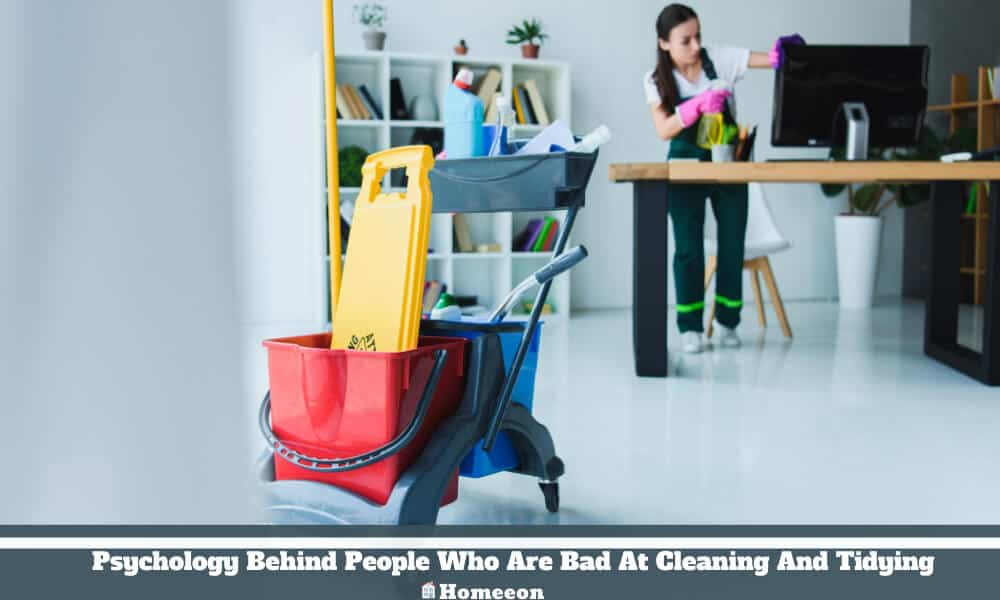Last Updated on August 5, 2023 By Emma W. Thomas
People who are bad at cleaning and tidying may experience psychological factors like procrastination, perfectionism, or a lack of organizational skills. Psychological barriers can hinder motivation and cause clutter accumulation.
How To Identify The Psychological Features That A Person Exhibits

If you are interested in knowing more about someone you just met, you can visit their home. Pay attention to their everyday habits and check for the following;
If They Place Junks In Boxes, Drawers, Or Closets
A person’s room or apartment may appear perfect at first sight. The floor could be clean, books neatly arranged, and have beautiful wallpaper. However, looking inside the closet or kitchen drawer could reveal crumpled clothes, broken items, or even old credit cards stashed inside. Such people could have a dramatic personality.
They will do everything to impress others by improving their outward appearance. These people prefer hiding useless and old stuff to sorting it out or getting rid of the same. They work hard to make the place look attractive other than tidy up.
No Repairs Or Renovations
You may find someone living in an apartment with leaky roofs or taps, old wallpapers, and other stuff. Some may also prefer keeping items in boxes to avoid spending money on new ones and treat their place as temporary. They live as if they intend to shift to a different place, get a mortgage, or even wait for their lives to change. The people will sometimes live in these messy apartments for several years.
The psychology behind this kind of living is that the individual lives in the future instead of the present. They tend to perceive their current life as a temporary discomfort that needs to be tolerated. Such individuals never make any concrete plans, and they always hope that somehow they will receive help from outside that will improve their circumstances.
A Full Trash Bin, Laundry Basket, Or Sink
Some people hate cleaning so much that they will use all dishes until their sink is full and have no clean utensils left. Others will wait until the trash can is full before they can empty it while some wait till the laundry basket is full before cleaning. Such issues are a result of procrastination. Instead of doing a little task regularly, someone prefers doing a lot but less often.
One may give such excuses as lack of time, being lazy, or postponing the work to a later date. If you are a procrastination victim, you can solve the problem by doing small tasks more often. Try taking out your trash daily and cleaning your dishes immediately after meals. Doing this will help you to form a healthy habit of doing things on time. The habits will also help you improve your performance at work and your relationship with others.
A Messed Up Workspace
Psychologically, the workspace is among the most remarkable place in your home or apartment. Some individuals may arrange everything nicely in folders which they then place on shelves. Others will put pens, plates, laptops, papers, and everything together in the same place. The items will occupy some space and be covered with dust.
Ironically, a messy workspace can be a sign of high self-esteem and immaturity as well. Although your desk is untidy, you can find everything and still work on it well. A messy desk often represents an inventive and creative personality.
If you do different things together, such as typing, drawing, or handwriting something, your workplace will most likely appear untidy. Alternatively, there is a probability that you usually have creative and extraordinary ideas.
The Place Looks Empty And Deserted
Some homes may look like the people only come to sleep there. The place may be tidy with very few dishes and furniture. There may also be no essential items such as cookers or refrigerators. Such apartments are popular with students who spend little time there.
As one gets older, they desire a more orderly and comfortable life. If the person spends more time in a place that looks empty, it could signal some psychological problems such as immaturity. The adult lives hoping that someone such as a partner will turn up and make the place more bearable and cozy for them.
An Untidy Bathroom
Your bathroom is a place where you can relax comfortably and forget about the day’s hustles. Taking a cold or hot shower helps you cool off after a busy day, and the smells from essential oils and salts help to rejuvenate our skin. A good shower also helps to improve the functioning of internal organs.
A clean bathroom shows how one cares about body hygiene and psychological comfort. A person who takes good care of themselves will have high-quality toothpaste, shower gels, body lotion, and different oils in their shower room. An empty bathroom with just a piece of soap and a razor with some dried foam on it may indicate that the person is stressed. Such a person has no time to care about their appearance.
A Lot Of Leftovers In The Kitchen
The kitchen should be among the tiniest areas in a home since this is where meals are prepared. Having leftovers, oil and grease stains, and tea and coffee stains on cups make the place look ugly and hazardous. Even if a person does not love cleaning, they will strive to keep their kitchen tidy to be safe. But some people are comfortable with a dirty kitchen.
An untidy kitchen does not only indicate laziness but could also be a sign of depression. A person lacks the energy to tidy up, they feel it is unnecessary, and they also have no value for themselves. One feels that they don’t deserve to live in a tidy place. Cleaning and organizing the kitchen regularly helps to improve a person’s mood. A person is also able to fight depression symptoms.
A Lot Of Unnecessary Stuff
Some people find it difficult to dispose of items they love and, therefore, keep things they do not need. You are likely to find old furniture on the balcony, bicycles that nobody rides, tea and dinner sets that no one needs, as well as other unimportant stuff. This character indicates a conservative personality of someone resistant to change and wants to hide from it.
If a person tends to bring useless stuff home frequently, it may indicate neurosis and compulsive behavior. These are people who will not stop hoarding.
A Spotless Place
Some people don’t mind vacuum-cleaning their carpets or washing their bathroom whenever they are free. While there is nothing wrong with this, if a person is too attentive to cleanliness, this may be a sign of problems. It may indicate that the person does not entertain guests since they may move or damage things. Such a person fears that entertaining guests could interfere with their perfect order.
The behavior may show an inclination to perfectionism. If one regularly cleans because the person fears dirt or germs, this could indicate anxiety. The person may regularly clean to get distracted from unpleasant thoughts and get rid of anxiety. Some studies have shown that when one cleans their rooms or apartments regularly, it could help solve concentration problems and make someone confident, happier, and more responsible.
Summary Of The Relationship Between Cleaning Habits And Psychology

| Cleaning Habits | Psychology Behind It |
| This could indicate depression, someone does not value themselves. | One aims at impressing others and has a dramatic personality. |
| Lack of repairs and renovations | One lives in the future other than the present. |
| A messy workspace | An inventive and creative personality |
| Full trash cans, laundry baskets, and sinks | Shows procrastination |
| The place looks empty and deserted | Shows immaturity. One lives with the hope that someone will appear and improve things for them. |
| So many leftovers in the kitchen | A conservative personality that is not open to change. Could be a sign of neurosis and compulsive behavior |
| Untidy bathroom | A stressed person who doesn’t have time for personal appearance |
| A lot of unnecessary stuff | A conservative personality that is not open to change. Could be a sign of neurosis and compulsive behaviour |
| Spotless place | Someone is not welcoming. Could also show anxiety. |
What Causes Someone to Not Clean Their House?
Maintaining a clean and organized home is crucial for both physical and mental well-being. However, many people struggle with keeping their houses clean, often due to various underlying causes. In this listicle, we will explore six common factors that can contribute to a person’s reluctance to clean their house.
- Busy lifestyle:
Our fast-paced lives often leave us with limited free time, making it difficult to prioritize cleaning. With demanding work schedules, family responsibilities, and social commitments, cleaning the house may take a backseat. This can often lead to cluttered spaces and neglected cleaning tasks. - Lack of motivation:
Cleaning can feel like an overwhelming and tedious task, especially for those who lack the motivation to keep things tidy. Without a strong drive or immediate consequences, some individuals may struggle to find the energy and willpower to start cleaning. This lack of motivation often stems from a lack of interest or personal satisfaction derived from cleaning activities. - Perfectionism:
Interestingly, individuals who strive for perfection may find it challenging to clean their homes. This is because they set extremely high standards for themselves, making it difficult to maintain a spotless environment. Cleaning can become an exhausting and never-ending cycle for perfectionists, leading to a tendency to procrastinate or avoid cleaning altogether. - Mental health challenges:
Poor mental health can have a significant impact on a person’s ability to clean their house. Conditions such as depression, anxiety, or chronic fatigue syndrome can drain a person’s energy levels and affect their motivation. In such cases, cleaning tasks may be overwhelming, and individuals may lack the necessary motivation or focus to tackle them. - Lack of cleaning skills or knowledge:
Not everyone has grown up with a strong emphasis on cleaning skills or has been taught effective cleaning methods. Without an understanding of how to efficiently clean different areas, some individuals may feel unsure about where to start. The lack of knowledge or confidence in their cleaning abilities can hinder their cleaning efforts and make the process seem more daunting than it actually is. - Physical limitations:
Physical health issues or physical limitations can make house cleaning an arduous task. Conditions like chronic pain, arthritis, or mobility issues can prevent individuals from being physically able to clean their homes. In such cases, seeking assistance from family members, friends, or professional cleaning services can be invaluable.
Wrapping Up
The way we organize the space around us speaks volumes about our personality. Someone can learn about us even if they are new to us by studying our apartments’ organization. Whether we love cleaning or not is not just a personality quirk but has some psychology behind it. There is an excellent link between someone’s daily habits and character.
Next time you want to learn about someone, visit them and look at a few aspects of their cleaning. This guide will help you know what it means and maybe offer some help to those you love.
References:
https://www.verywellmind.com/psychology-of-a-messy-room-4171244
https://www.quora.com/What-is-the-psychology-behind-people-who-are-bad-at-cleaning-and-tidying
Emma is a graduate of Domestic Science or Family and Consumer Sciences (Home Economics) from the University of Wisconsin. She has 7 years of experience Working with the strategic section of BestBuy and now writing full-time for Homeeon.
From Managing the Home, Interiors, Cleaning, and Exteriors to Gardening and everything about Making A Home Liveable – is her passion and this Homeeon is the result of this.
Emma loves decorating her home with the best stuff found online. She cares about quality over anything and writes reviews about them here in Homeeon. Get in touch with her over Pinterest.
Keep reading her blogs.

